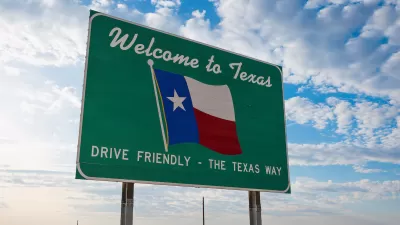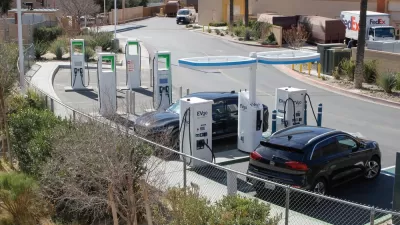Thanks to voters, at least $1.2 billion in oil and gas taxes a year that would normally have been directed to the state's Rainy Day Fund is diverted to the highway fund, where it will be used to improve the state's crumbling road infrastructure.
As indicated last week in "Campaign 2014 Results: Transportation, Energy, Conservation Measure," the Texas Transportation Funding Amendment, Proposition 1 breezed by with 80 percent of voters supporting the popular measure.
According to Ballotpedia, passage of "(t)he measure diverted half of the general revenue derived from oil and gas taxes from the Economic Stabilization Fund [PDF], also known as the Rainy Day Fund, to the State Highway Fund for the purpose of providing transportation funding for repairs and maintenance of public roads."
"The measure will make about $1.7 billion a year available for highway projects, a figure which will fluctuate with the status of the state's energy industry," reports Newsradio 1200 WOAI. [Ballotpedia cites $1.2 billion annually].
Scott Haywood, who headed 'Move Texas Forward,' which pushed for approval of the proposition, says the funding will be available immediately. "This money is from the past year of oil and gas taxes, so it has already been collected," he said. "Hopefully it will be transferred into the transportation fund by the end of this year
One caveat, the measure "includes a restriction that none of the money can be used for toll roads," which are not at all popular in north Texas.
A top funding priority for the State Highway Fund will be repairing the state's crumbling "farm-to-market roads," particularly in the Eagle Ford Shale where much of the oil and gas tax revenue providing the new road funds are generated.
While the new road revenue is welcomed, at least $5 billion a year is needed for road repair and replacement, notes WOAI. "Lawmakers when they meet in January are expected to consider two other measures:
- designating 100% of the vehicle sales tax to highways, and
- ending 'diversions' of gas tax money to other uses." [as voters in Maryland and Wisconsin approved on Nov. 4]
Noticeably absent is even a consideration of raising the state's 20-cent gas tax, 42nd lowest in nation, not raised since 1991. The U.S. average is 28.55 cents, according to the American Petroleum Institute [PDF].
FULL STORY: Proposition One Highway Money to Begin Flowing by Year's End

Maui's Vacation Rental Debate Turns Ugly
Verbal attacks, misinformation campaigns and fistfights plague a high-stakes debate to convert thousands of vacation rentals into long-term housing.

Planetizen Federal Action Tracker
A weekly monitor of how Trump’s orders and actions are impacting planners and planning in America.

In Urban Planning, AI Prompting Could be the New Design Thinking
Creativity has long been key to great urban design. What if we see AI as our new creative partner?

Cal Fire Chatbot Fails to Answer Basic Questions
An AI chatbot designed to provide information about wildfires can’t answer questions about evacuation orders, among other problems.

What Happens if Trump Kills Section 8?
The Trump admin aims to slash federal rental aid by nearly half and shift distribution to states. Experts warn this could spike homelessness and destabilize communities nationwide.

Sean Duffy Targets Rainbow Crosswalks in Road Safety Efforts
Despite evidence that colorful crosswalks actually improve intersection safety — and the lack of almost any crosswalks at all on the nation’s most dangerous arterial roads — U.S. Transportation Secretary Duffy is calling on states to remove them.
Urban Design for Planners 1: Software Tools
This six-course series explores essential urban design concepts using open source software and equips planners with the tools they need to participate fully in the urban design process.
Planning for Universal Design
Learn the tools for implementing Universal Design in planning regulations.
Appalachian Highlands Housing Partners
Gallatin County Department of Planning & Community Development
Heyer Gruel & Associates PA
Mpact (founded as Rail~Volution)
City of Camden Redevelopment Agency
City of Astoria
City of Portland
City of Laramie




























